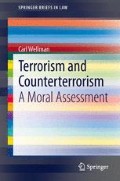Abstract
Terrorism cannot be justified either as he least harmful option or because it protects human rights alone because it both inflicts harms and violates human rights. However under very exceptional circumstances it might be justified when it both protects rights and prevents harms more than it violates rights and harms its victims. Although it cannot be justified merely because it equalizes rights violations, this may be a relevant consideration because the right to equitable treatment cannot be ignored in any possible justification. Terrorism could be justified because it liberates an oppressed people only if on balance it protects rights and prevents harms more fully than it violates rights and inflicts harms. It cannot be justified merely as an exercise of the right to self-determination or as a necessary means to a moral right because no moral right is absolute and unconditional. When terrorism is justified as a permissible tactic in a just war or as an exercise of the right to self-defense, this is because in this instance it protects rights and prevents harms more fully than it violates rights and inflicts harms. This might also be true when it is necessary to overcome an extreme emergency, although possibly an extreme emergency might exclude any judgment of wrongness without implying that terrorism is morally right. There is no objective evidence of any religious duty to engage in terrorism.
Access this chapter
Tax calculation will be finalised at checkout
Purchases are for personal use only
Notes
- 1.
See Carl Wellman, Real Rights, pp. 41–59.
References
Casals NT (2006) Group rights as human rights. Springer, Dordrecht
Combacau J (1986) The exception of self-defense in U.N. practice. In: Cassese A (ed) Current legal regulation of the use of force. Martinus Nijhoff Publishers, Dordrecht, pp 9–38
Dworkin R (1977) Taking rights seriously. Harvard University Press, Cambridge
Dworkin R (1984) Rights as trumpts In jeremy waldron (ed) Theories of rights. Oxford University Press, New York
Fanon F (1966) The wretched of the earth. Grove Press, New York
General Assembly (1960) Declaration on the granting of independence to colonial countries and peoples. Yearbook of the United Nations 1960. Columbia University Press, New York, pp 49–50
General Assembly (1987) Resolution 42/159. Measures to prevent international terrorism. Yearbook of the United Nations 1987. United Nations, New York, pp 1063–1965
Hamas Charter (1988) Available on web at Hamas Charter
Hare RM (1979) On terrorism. J Value Inq 13:241–249
Held V (2008) How terrorism is wrong: morality and political violence. Oxford University Press, Oxford
Honderich T (2008) Terrorism in palestine. In: Law S (ed) Israel, Palestine and terror. Continuum Publishing Group, London, pp 3–16
Kahane M (1981) They must go. Grosset & Dunlop, New York
Keeton WP (1984) Prosser and keeton on the law of torts, 5th edn. West Publishing Co., Saint Paul
Louw PE (2004) The rise, fall, and legacy of apartheit. Praeger, Westport
Nickel JW (2007) Making sense of human rights. Blackwell Publishers, Oxford
Nickel JW (2008) Rethinking divisibility: towards a theory of supporting relations between human rights. Hum Rights Q 30:984–1001
Nielsen K (1981a) Violence and terrorism: its uses and abuses. In: Leiser BM (ed) Values in conflict: life, liberty, and the rule of law. Macmillan, New York, pp 435–470
Nielsen K (1981b) On justifying terrorism. Inquiry 24:21–57
Primoratz I (2007) Stanford Encyclopedia of philosophy. http//plato.stanford.edu/entries/terrorism/
Razack S (2003) Those who “Witness the Evil”. Hypatia 18:204–211
Shue H (1980) Basic rights: subsistence, affluence and U. S. foreign policy. Princeton University Press, Princeton
Valls A (2000) Can terrorism be justified? In: Valls A (ed) Ethics in international affairs: theories and cases. Rowman & Littlefield, Lanham, pp 65–80
Walzer M (2000) Just and unjust wars: a moral argument with historical illustrations, 3rd edn. Basic Books, New York
Wellman C (1987) Terrorism and moral rights. In: Howie J (ed) Ethical principles and practices. Southern Illinois Press, Carbondale and Edwardsville, pp 128–153
Wellman C (1995) Real rights. Oxford University Press, New York
Author information
Authors and Affiliations
Corresponding author
Rights and permissions
Copyright information
© 2013 The Author(s)
About this chapter
Cite this chapter
Wellman, C. (2013). How Could Terrorism Be Justified?. In: Terrorism and Counterterrorism. SpringerBriefs in Law, vol 9. Springer, Dordrecht. https://doi.org/10.1007/978-94-007-6007-3_3
Download citation
DOI: https://doi.org/10.1007/978-94-007-6007-3_3
Published:
Publisher Name: Springer, Dordrecht
Print ISBN: 978-94-007-6006-6
Online ISBN: 978-94-007-6007-3
eBook Packages: Humanities, Social Sciences and LawLaw and Criminology (R0)

